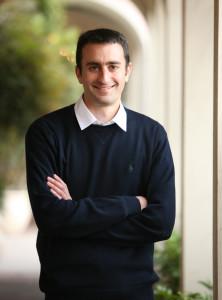event
IRIM Robotics Seminar–Jonathan Rogers
Primary tabs
Georgia Tech’s Jonathan Rogers presents “Risky Robotics: Developing a Practical Solution for Stochastic Optimal Control” as part of the IRIM Robotics Seminar Series. The event will be held in the Georgia Tech Manufacturing Institute Auditorium from 12-1 p.m. and is open to the public.
Abstract
Risk is a ubiquitous aspect of control and path planning for robots operating in unstructured real-world environments. Nevertheless, humans still far surpass robots in their ability to evaluate complex tradeoffs under uncertainty through risk analysis and subsequent decision making. Many traditional approaches to the stochastic optimal control problem, such as Partially Observable Markov Decision Processes (POMDP’s), suffer from the curse of dimensionality and become computationally intractable in many real-world scenarios. In this seminar, a new class of stochastic control algorithms is proposed that makes use of emerging high-performance computing devices, specifically GPUs, to perform real-time uncertainty quantification (UQ) as part of a feedback control loop. These algorithms propagate the time-varying probability density of the robot state and optimize control actions with respect to accuracy, obstacle avoidance, and other criteria. Key to practical implementation of these algorithms is the fact that many UQ algorithms can be parallelized; thus they can leverage emerging embedded high-throughput devices for real-time or near real-time execution. Following an overview of the general formulation of these stochastic control algorithms, examples are provided in the form of autonomous parafoil and quadrotor flight controllers that make use of real-time uncertainty analysis for obstacle avoidance in constrained environments. Recent experimental flight tests using embedded GPUs show that a strong coupling between UQ and optimal control offers a practical solution for risk mitigation by autonomous systems.
Bio
Jonathan Rogers is an assistant professor in the Woodruff School of Mechanical Engineering at the Georgia Institute of Technology, where he is also director of the Intelligent Robotics and Emergent Automation Laboratory (iREAL). Previously, he served as an assistant professor of Aerospace Engineering at Texas A&M University. Roger’s research interests lie at the intersection of nonlinear dynamics, robust control, and state estimation. He received his PhD in Aerospace Engineering from Georgia Tech in 2009, and a BS in Physics from Georgetown University in 2006. In 2011, he was selected as an Army Research Office Young Investigator for his work in state estimation for complex dynamical systems.
Status
- Workflow Status:Published
- Created By:Josie Giles
- Created:01/06/2015
- Modified By:Fletcher Moore
- Modified:04/13/2017
Categories
Keywords
Target Audience

